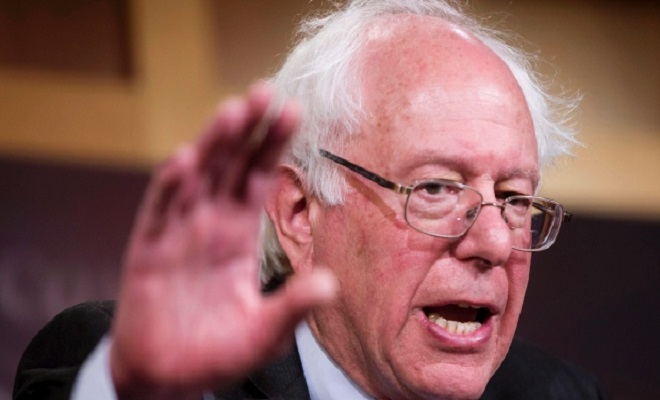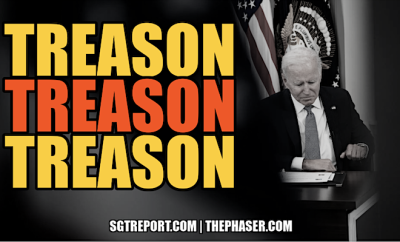 CBC News
CBC News
Politics
My Prediction: Bernie Sanders Will Win the White House
by Eric Zuesse, Washington’s Blog:
On May 12th, I presented my analysis of the polling as of that time, headlining, “The Early Signs of Whom The Next U.S. President Will Likely Be: Presidential Polls Look Confusing Regarding Bernie, But Downright Bad Regarding Hillary & All Republicans.” Based on the net-favorability ratings of candidates in the first poll that had really meaningful results on that most important of all factors (which poll had just been published), and also based on the latest available reliable poll of Americans’ ideological preferences (which had been taken in 2011, but that’s okay because ideology changes only very slowly), I concluded that Vermont U.S. Senator Bernie Sanders was likely to surprise on the upside at the start of his contest, and that, “Sanders would probably be able to crush any Republican except perhaps Rand Paul, if he were to win the Democratic primaries.” He is already surprising on the upside (though pundits haven’t yet caught on that Hillary’s a dud), and so I am now predicting that Sanders will win, first, the Democratic nomination, and then the White House. But, first, to summarize:
The crucial net favorabilities were shown and documented in that May 12th article to be outright terrible for every candidate except Scott Walker, Marco Rubio, and Bernie Sanders; they were merely bad for Walker and Rubio; and they were probably marginally good for Sanders, but the latest poll hadn’t even included Sanders’s name, and so for him I extrapolated from ideologically the only candidate, who had been named, who was at all similar to Sanders ideologically, and this was Elizabeth Warren; and she had a slightly positive net favorability rating, which was by far the best of any of the named candidates (either male or female). Based on information that I’ve been provided access to, she will not be entering the contest, and Senator Sanders will be the only progressive candidate running in the Democratic primaries.
The 2011 ideological poll showed that of the five ideological orientations that were named, the one with the highest net-favorability — the ratio of “positive” to “negative” ratings — by the American public, was “Progressive,” at 67%/22%, or 3.05; and the second-highest was “Conservative,” at 62%/30%, or 2.07. Like Senator Warren, Senator Sanders is one of the U.S. Senate’s three leading (if not the Senate’s only three) progressives. He clearly represents the most-widely-shared ideology: progressivism. If he wins the Democratic nomination, then the nation will be in for its first clear ideological choice since 1932 in a two-major-Party contest between a progressive Democrat versus a conservative Republican. That time it was FDR versus Herbert Hoover.
Of course, FDR won. Back in 1932, the conservative’s deadweight load, which the Republican had to overcome but couldn’t, was the crash of 1929. In 2016, the conservative’s deadweight load, which he’ll have to overcome but won’t be able to, will be his record of supporting or opposing George W. Bush’s decision to invade Iraq in 2003. Everyone but Republicans already knows that that was a catastrophic decision in every way, and was never justifiable; so: no candidate who is even on the fence about this important matter can stand even a chance of winning the Presidency if his or her chief opponent has always been clearly opposed to it, as Sanders has been, in both words and actions. Sanders, then a member of the U.S. House, was one of the small minority who voted in 2002 against it. And, unlike Barack Obama, who wasn’t even a national politician then and who spoke in 2002 about the Iraq question only briefly and in passing (in a video-clip that became famous in 2008), Bernie Sanders spoke against it passionately and repeatedly — and then he actually voted against authorizing the invasion. (And here’s the final vote, in both the Senate and the House.) By contrast, every current Republican Presidential candidate, except Rand Paul, says that GWB made the right decision “based on what was known then” (referring to the selective release by Bush’s Administration of faked evidence supporting the decision to invade). Marco Rubio contradicts himself about the matter, but basically he says that in the final analysis, “The world is a better place because Saddam Hussein does not run Iraq.” Even that statement would hurt him a lot in the general election (unless the Democrat is Clinton, since she actually voted to invade), because most Americans aren’t that stupid, to think that there’s any excuse whatsoever for Bush’s choice to fake evidence and then to invade Iraq on the basis of it — it was clearly a rigged deal from the get-go, to invade Iraq. Rubio is betting that the only way to win the Republican nomination is to support that rigged invasion; but Paul is betting that, by the time of the primaries, enough even of Republicans will have come to the (long overdue) realization that this issue could kill the Party’s chances in the general election, and that they’ll therefore get in line behind Paul’s candidacy as the Party’s only hope to get this issue off the backs of the Republican Party. The other leading Republican candidate, Scott Walker, is a pure mainstream Republican on the matter, saying that the decision was based on bad intelligence, “but knowing what we know now, we should not have gone into Iraq.” This line might suffice for him to be able to win the Republican nomination, but, if Bernie Sanders will be the Democrat he’ll be running against, then the Democrat will win, no matter how much money Republican billionaires pour into supporting their nominee. (Again, if Hillary becomes the Democratic nominee, the Republican nominee might win the Presidency — and probably will win if that Republican happens to be Rand Paul.)
Of course, the 2016 Presidential campaign won’t be about only the catastrophe in Iraq and George W. Bush’s having created it; there’s a President who followed after him, and he has continued GWB’s other catastrophe, the Wall Street bailouts and non-prosecution of the mega-banksters who cheated their ways to ‘AAA’ MBS-creating-&-marketing mega-bank fortunes (and the bailout-generated $10 trillion+ increase in the U.S. federal debt that was required in order for the public to absorb those mega-banksters’ “toxic assets”); and Sanders has always been against that pro-Wall-Street, anti-Main-Street, policy, too — both in words and in deeds. (And QE “The Greatest Backdoor Wall Street Bailout of All Time” is still continuing and so the total tab cannot yet be known, and Sanders has always been against that part of the Wall Street bailout too.) He was consistently correct on both of the big issues of recent U.S. history — both of the issues that depleted America’s future for the benefit of today’s super-rich.
On 15 February 2011, after Bush’s successor had been in office already two years continuing the bailouts, Rassmussen Reports bannered their poll, “57% Still Believe Bailouts Were Bad for US,” and also reported, “68% say bank bailout money went to those who caused meltdown.” Those overwhelming public views against the bailouts have also been not only Sanders’s own views throughout the period, but they’ve consistently been Sanders’s votes in the U.S. Senate, too, even at the start; so, on the two signature Bush catastrophes, Sanders would be in a perfect position to maul any Republican nominee, unless it turns out to be Rand Paul. However, unlike Scott Walker, whose net favorability rating is only modestly negative (i.e, it’s less than 1; it’s 73%, to be precise), Rand Paul’s is like almost all of the Republican field’s: it’s extremely negative (i.e., his ratio of strongly favorable to strongly unfavorable is much less than 1: it’s 56%). (Clinton’s, for comparison, is 69%. Elizabeth Warren’s was the only polled name that was positive: 1.08. As was previously mentioned, Sanders’s name wasn’t polled, and Warren was the only named candidate whose ratio was net-positive.)
In an earlier article, I stated the case “Why Hillary Clinton Would Be a Weak Presidential Nominee for Democrats,” and I explained why Ms. Clinton will never be able to rise from her present poor net favorability ratings. All the good publicity about her is past (from her flaks), while her support (being based purely on PR, sheer fluff) was a mile wide and an inch deep. The more that voters get to see her actual record, the more they’ll distrust her words. That reason she’d be a weak general-election candidate is: she’s not at all a trustworthy person (except by her financial backers), and there’s nothing she’ll be able to do at this late date to convince general-election voters that she is. The trust issue is so bad for her, that no matter how much money is spent on her campaigns, it’ll be like trying to paddle a boat not in water but in air — there won’t be the traction that’s needed to get her to being the first person past the finish-line in the boat-race. That boat has already been sold to the highest bidder, even before the race begins. She can evade, but she cannot hide, now that the contest has actually started. As more Democrats learn about this, they’ll turn away. Too many Democrats will avoid voting in the final, the general-election contest, or else will protest-vote for some third-party nominee; whereas the Republican nominee, whomever he is, will clearly be Republican in more than just his official designation. By contrast to Clinton: if Sanders is the Democrat, then voter-turnout on Election Day on the Democratic line will be enormous. And turnout in a Presidential election is crucial also in a much broader sense: it largely determines which of the two Parties will control both the Senate and especially the House (where everybody is up for election every two years). Even if Clinton were to win (which is unlikely), she would then be dealing in 2017 with a strongly Republican Congress, because of 2016’s resulting depressed Democratic voter-turnout. By contrast: if Sanders is the nominee, then not only will he win, but he will possibly (maybe even likely) be dealing with a Democratic Congress in 2017, by virtue of his drawing so many Democrats to the polls on Election Day 2016.
——
http://elections.huffingtonpost.com/pollster/hillary-clinton-favorable-rating
In other words: after having been a popular celebrity since at least January 2009, Hillary Clinton has now become, again, a mere politician, but this time with the heavier-than-ever baggage of her actual record (and especially of her having destroyed crucial evidence of that record, which she had secreted on her own private server), so that her evasive behaviors, verbal and otherwise, have now become her message; and what she says or does from here on can only collapse the house-of-cards that she had long been creating.
As of May 26th, her net favorability rating, shown at Huffington Post, had finally switched from positive to negative (47.8% negative versus 45.9% positive). This measure shown at HuffPo isn’t as accurate a measure, however, as the figures that I had linked to at the first link in the present article, because instead of building the net ratios there on favorables versus unfavorables, I built it on strong favorables versus strong unfavorables; and, especially at this early phase in a political campaign, that’s actually a far more accurate predictive measure, because the few people in the public who have strong feelings about a given candidate are the ones who will likeliest become the volunteers who will then serve as the core of the get-out-the-vote effort and who will consequently build the candidate’s volunteer campaign, if there is any. (If there isn’t any, then the Democratic candidate will surely lose, because the big-money campaign will likely go overwhelmingly to the Republican regardless.) So: the net favorability-ratios that were shown in my first-linked-to article are far more accurate indicators than are the ratios that are graphed at HuffPo; and what these ratios show is a far higher net unfavorability regarding all of the candidates.
——
However, the most important decision that American voters will be making in the 2016 elections will be the decision that Democratic voters collectively will be making in their Democratic primaries. That decision, in the primaries, rather than in the general election, will be the key to deciding America’s future. The decision that Republican voters will be making in their Party’s primaries, might not matter much, although, in the final analysis, if they choose Rand Paul, then that could change: there could be a real contest in the final election, against Sanders. (Furthermore, if Clinton does win the Democratic contest, then the final race will instead be between two candidates both of whom will have net negative favorability ratings — both Clinton and Paul — but turnout will almost certainly be higher on the Republican than on the Democratic side; so, Paul would probably win that contest.)
All of the pundits have been saying, all along, that Clinton is the most-likely candidate to win the White House, but they’re looking at the wrong indicators. Often, these same pundits were also saying that Jeb Bush would be the likeliest Republican to be able to win the White House, or that Christ Christie would be. I don’t pay attention to what the pundits say. Of course, the political bettors do; and, so, as of today, the betting odds heavily favor Clinton as by far the #1 likeliest person to become America’s next President. The public read the pundits. And the pundits make the arguments that their bosses, who are chosen by the media-owners, want to be published. (The media-owners want the final contest to be between two candidates who are both owned by the billionaire class, because a billionaire decides which media will receive his corporation’s advertising dollars and other favors; and that’s what keeps the media going.)
The pundits aren’t published — they’re fired — if they don’t serve their bosses. I don’t serve any boss; I serve only the truth as I see it, and I always explain and document what I am seeing. And when what I see changes, I report and explain that change, just as I had reported what was before it which has changed. My opinion isn’t ever set in stone. I might change it at any time. But all I can ever report is what I see, when I see it.
What I am seeing right now, which is the first time that things have looked clear enough for me to make a prediction in the U.S. Presidential contest, is the likelihood that the next President of the United States will be Bernie Sanders. The reasons for that prediction have been summarized here, based on the documentation that’s in the sources that have been linked-to here. Those linked articles contain the basic data that I consider, on my standard best-evidence basis, to be determinative, at this stage in the development of the 2016 U.S. Presidential campaign.
———-
Investigative historian Eric Zuesse is the author, most recently, of They’re Not Even Close: The Democratic vs. Republican Economic Records, 1910-2010, and of CHRIST’S VENTRILOQUISTS: The Event that Created Christianity, and of Feudalism, Fascism, Libertarianism and Economics.
Read More @ Washington’s Blog.com













